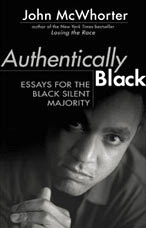Book Review: Authentically Black
Looking for a provocative book about race, Candace, 17, recommends Authentically Black by conservative black author John McWhorter.
 Black intellectual and Harvard scholar W.E.B. Du Bois once stated, "The biggest problem in the 20th century [in American society] will be the color line."
Black intellectual and Harvard scholar W.E.B. Du Bois once stated, "The biggest problem in the 20th century [in American society] will be the color line."
Many believe that our race or ethnic background defines who we are as people in American society. Author John McWhorter disagrees with that notion, and believes that the "color line" shouldn’t be something that keeps black Americans out of the economic or social mainstream.
McWhorter, a conservative black professor of linguistics at UC Berkeley, wrote that there are substantial numbers of blacks in America that believe racism is a pervasive and threatening problem in our society, and thus are "victimized" because of racism. McWhorter disagrees and notes that this group of blacks believes that any kind of assimilation into mainstream America (i.e. white America) leads to division within the black race because some blacks choose to maintain their "authentic blackness," whereas others assimilate.
McWhorter gives a number of examples of what blacks consider to be "authentically black." He cites black scholars who believe that to be "authentically black," one has to celebrate one’s African ancestry and support the teaching of Ebonics as a form of English in elementary schools. They say one must also listen to "black" music, believe that racial profiling exists, agree with affirmative action, advocate for slavery reparations and solely watch black television.
Throughout the book, McWhorter keenly and eloquently disagrees with the public’s perceptions of blacks, and blacks’ need to support "culturally black" things. I would also agree that society would have you think that speaking in an ethnic speech, and dressing in "urban clothing," makes you "culturally black."
McWhorter is distressed by media portrayals of blacks as lazy, loud and ignorant. He writes about rap videos that depict mostly inner-city black men seeking only money, women and drugs. Well, not all blacks live in the inner-city and listen to or even like rap music. Who decides what is "authentically black?"
In his commentary, the author notes that not all black people are poor or on welfare. He also points out that instead of being so defensive when whites use the word "nigger," blacks should encourage other blacks (i.e. rappers) to refrain from saying "nigga," or "niggaz" in everyday conversations.
McWhorter writes that some black kids are reluctant to study hard or improve their vocabulary because it is seen as "acting white." He says that this feeling is "the prime culprit in black students’ lagging grades and test scores." McWhorter points out that talking properly or doing well in school should be the expectation for not just whites and Asians, but for blacks, also. McWhorter is against affirmative action, and believes that black youth should be held to the same standard that others are held to.
I thoroughly enjoyed this book, so much that I finished all 264 pages in two days. The essence of McWhorter’s thinking, in my opinion, is not to forget racism, but to celebrate the fact that blacks have an all-around rich culture. He mentions that too many people treat Black History Month as a period to remember past injustices of blacks throughout American history. McWhorter doesn’t say that we should forget about racist Jim Crow laws or slavery, but he argues that the month should focus more on great black inventors, politicians and other influential icons.
The point of his book is to tell black America that just because a portion of blacks may act a certain way, or are portrayed in the media a certain way, doesn’t mean that what they do is "authentically black." Not all black people think or do the same things. There is great diversity within every ethnic and racial group.




